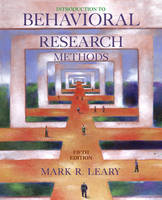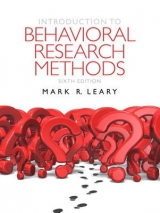
Introduction to Behavioral Research Methods
Pearson (Verlag)
978-0-205-54414-1 (ISBN)
- Titel erscheint in neuer Auflage
- Artikel merken
Mark R. Leary, Ph. D., Professor of Psychology and Neuroscience at Duke University, received his B.A. from West Virginia Wesleyan College (1976) and his doctorate from the University of Florida (1980). He taught at Denison University, the University of Texas at Austin, and Wake Forest University before moving to Duke. Dr. Leary’s research and writing focus on social motivation and emotion, areas in which he has published more than 150 scholarly articles and chapters. Dr. Leary is a Fellow of the American Psychological Association, the Society for Personality and Social Psychology, and the Association for Psychological Science, as well as a member of the International Association for Relationship Research and the International Society for Self and Identity. Dr. Leary was the founding editor of Self and Identity, a new scholarly journal, and served for nine years as Associate Editor of the Journal of Social and Clinical Psychology. He has also served on the editorial review boards of the Journal of Personality and Social Psychology, Journal of Personality, Personality and Social Psychology Bulletin, Personality and Social Psychology Review, and Emotion.
All chapters begin with a chapter outline and conclude with “Summary,” “Key Terms,” “Questions for Review,” and “Questions for Discussion.”
Preface.
1. Research in the Behavioral Sciences.
The Beginnings of Behavioral Research.
Goals of Behavioral Research.
The Value of Research to the Student.
The Scientific Approach.
Behavioral Science and Common Sense.
Philosophy of Science.
The Role of Theory in Science.
Research Hypotheses.
A Priori Predictions and Post Hoc Explanations.
Conceptual and Operational Definitions.
Proof and Disproof in Science.
Strategies of Behavioral Research.
Domains of Behavioral Science.
A Preview.
2. Behavioral Variability and Research.
Variability and the Research Process.
Variance: An Index of Variability.
Systematic and Error Variance.
Assessing the Strength of Relationships.
Meta-Analysis: Systematic Variance Across Studies.
3. The Measurement of Behavior.
Types of Measures.
Scales of Measurement.
Estimating the Reliability of a Measure.
Estimating the Validity of a Measure.
Fairness and Bias in Measurement.
4. Approaches to Psychological Measurement.
Observational Methods.
Physiological Measures.
Self-Report: Questionnaires and Interviews.
Archival Data.
Content Analysis.
5. Descriptive Research.
Types of Descriptive Research.
Sampling.
Describing and Presenting Data.
6. Correlational Research.
The Correlation Coefficient.
A Graphic Representation of Correlations.
The Coefficient of Determination.
Statistical Significance of r.
Factors That Distort Correlation Coefficients.
Correlation and Causality.
Partial Correlation.
Other Correlation Coefficients.
7. Advanced Correlational Strategies.
Predicting Behavior: Regression Strategies.
Assessing Directionality: Cross-Lagged and Structural Equations Analysis.
Uncovering Underlying Dimensions: Factor Analysis.
8. Basic Issues in Experimental Research.
Manipulating the Independent Variable.
Assignment of Participants to Conditions.
Experimental Control.
Eliminating Confounds.
Error Variance.
Experimental Control and Generalizability: The Experimenter's Dilemma.
9. Experimental Design.
One-Way Designs.
Factorial Designs.
Main Effects and Interactions.
Combining Independent and Subject Variables.
10. Analyzing Experimental Data.
An Intuitive Approach to Analysis.
Hypothesis Testing.
Analysis of Two-Group Experiments: The t-Test.
Analyses of Matched-Subjects and Within-Subjects Designs.
11. Analyzing Complex Designs.
The Problem: Multiple Tests Inflate Type I Error.
The Rationale behind ANOVA.
How ANOVA Works.
Follow-Up Tests.
Between-Subjects and Within-Subjects ANOVAs.
Multivariate Analysis of Variance.
Experimental and Nonexperimental Uses of Inferential Statistics.
Computer Analyses.
12. Quasi-Experimental Designs.
Pretest-Posttest Designs.
Time Series Designs.
Longitudinal Designs.
Program Evaluation.
Evaluating Quasi-Experimental Designs.
13. Single-Case Research.
Single-Case Experimental Designs.
Case Study Research.
14. Ethical Issues in Behavioral Research.
Approaches to Ethical Decisions.
Basic Ethical Guidelines.
The Principle of Informed Consent.
Invasion of Privacy.
Coercion to Participate.
Physical and Mental Stress.
Deception in Research.
Confidentiality in Research.
Common Courtesy.
Ethical Principles in Research with Animals.
Scientific Misconduct.
A Final Note.
15. Scientific Writing.
How Scientific Findings Are Disseminated.
Elements of Good Scientific Writing.
Avoiding Biased Language.
Parts of a Manuscript.
Citing and Referencing Previous Research.
Other Aspects of APA Style.
Sample Manuscript.
Glossary.
Appendix A: Statistical Tables.
Appendix B: Computational Formulas for ANOVA.
References.
Index.
| Erscheint lt. Verlag | 2.10.2007 |
|---|---|
| Sprache | englisch |
| Maße | 191 x 235 mm |
| Gewicht | 880 g |
| Themenwelt | Geisteswissenschaften ► Psychologie |
| Sozialwissenschaften ► Soziologie ► Empirische Sozialforschung | |
| ISBN-10 | 0-205-54414-2 / 0205544142 |
| ISBN-13 | 978-0-205-54414-1 / 9780205544141 |
| Zustand | Neuware |
| Haben Sie eine Frage zum Produkt? |
aus dem Bereich



